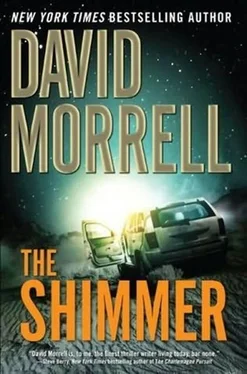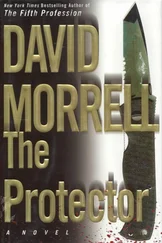Outraged, Lockhart slung his assault carbine over his shoulder. The right banister dangled from where its metal was anchored in concrete. It wobbled when he put his weight on it. Holding his breath, sweating, he climbed down the railing, hand over hand.
At the bottom, he tried not to cough from the bitter smoke. After surveying the mangled bodies, he had no doubt that there was nothing he could do to help.
He took a gas mask from a dead man and put it on. It made him feel smothered, but at least it stifled his need to cough. The smoke drifted past its lenses.
The music continued pulsing.
Some of the corpses had grenades. Lockhart took a few, then un- slung his M4 and inched forward, ready to shoot at any movement.
The glow from the walls intensified. He inched along a hallway, reached an open door on the right, and threw a grenade into it, quickly ducking back. Amid the glare of the explosion, he heard glass and metal blowing apart.
He continued through the swirling smoke and reached an open door on the left-the source of the music. Pulling a pin from another grenade, he was about to free the arming lever when a weak voice came from inside.
“Don’t. I’m sick. All I want to do is listen to the music. Let me die listening to the music.”
“You’re Halloway?” he replied without moving into the doorway.
“Used to be.”
“Used to be? That doesn’t make sense.”
“Do you like vodka and orange juice?”
“You’re still not making sense.”
“You don’t taste vodka and orange juice?”
“All I taste is smoke.”
“The first time I got drunk, it was on vodka and orange juice,” the weak voice said, its owner having trouble breathing.
“Well, this’ll be your last,” Lockhart replied angrily.
“Please… just let me listen to the music a little longer. It’s all I have.” The voice sucked air. “I can’t even dance any longer.”
“I don’t know what the hell you’re talking about, but I guarantee your dancing days are over.” Lockhart continued to hold the grenade, his fingers over the arming lever. “You shouldn’t have messed with the colonel’s project.”
“The colonel’s a prick.”
Lockhart hesitated. “You’re right about that.”
He was suddenly aware that the floor felt unsteady.
“Did you ever want to be a rock star?” Holloway managed to ask.
Lockhart had once heard a man breathing through a hole in his throat. That same liquid wheezing sound was what he now heard.
“Rock star? Wasn’t high on my list.”
“What did you want to be?”
“Never thought about it.” Unbidden, Lockhart remembered the Harley-Davidson he’d left a couple of miles away.
As he prepared to throw the grenade, he frowned, feeling the walls tremble.
“I didn’t know it was possible to bleed from so many places at once,” Halloway murmured, his voice sounding more gurgly. “I’m pretty much dead already. Just let me go listening to the music.”
Amid the smoke, the roof vibrated, a chunk of concrete dropping from it. Lockhart had the sense that everything was somehow connected to the music.
He imagined riding the Harley.
The floor shifted enough that he had trouble keeping his balance.
“Yeah,” Lockhart said, “Colonel Raleigh’s a prick. What you did, was it worth it?”
“Hell, yes.” Halloway coughed up something thick.
“Hell’s where you’re going. I doubt there’s music, though.”
Lockhart threw the grenade into the room and stepped back, put- ting his hands over his ears. The blast shook him. He heard flying debris clatter from the room. What he didn’t hear any longer was the music.
The corridor kept trembling. As more chunks fell from the walls and the ceiling, he turned and hurried as quickly as he could through the smoke. Hand over hand, he climbed the wobbling metal banister, fearful that it would snap.
At the top, he heard the crackle-hiss-hum of the beam of light and emerged into its hovering glare. When he threw away the gas mask, he noticed that the air had the odor of an electrical fire.
The earth vibrated.
He ran through the three open gates, charging along the lane. All he could think of was the motorcycle and how he’d love to ride it forever.
He stretched his legs farther, racing faster.
When he was about a mile from the observatory, he felt the heat of an explosion behind him. The shock wave made him stagger. He looked over his shoulder and saw the observatory erupting. The dishes blew apart. The most dramatic detonation took place in the sky, like the hugest skyrocket he’d ever seen. But it seemed much farther away than a simple rocket could go.
The only explanation he could think of was that a satellite was exploding.
Raleigh felt a vibration.
“Does the floor seem unsteady?” he asked the men in front of the electronic instruments. The earplugs made his voice sound distant.
“Everything’s starting to tremble,” a man acknowledged. “I’m hearing some kind of hum.”
“Push your earplugs in deeper.”
“They’re in as far as they’ll go.”
“Then use the noise-reducing headphones.”
Raleigh and the rest of the team put them on.
“I still hear a hum,” the man said faintly.
On a video monitor, Raleigh saw the flames from the crashed helicopters. Otherwise the area was dark, people reacting in panicked confusion, the green of the night-vision camera making them look grotesque. Another monitor revealed how out of control the German shepherd had become. Jaws snapping, it lunged at its trainer.
Shoot it, Raleigh urged.
The trainer did in fact reach for a pistol under his shirt, but the dog’s snapping jaws made him lurch back and fall. The trainer fired once into the air as the animal leaped over him, yanked the leash free, and rushed into the night.
“The hum’s getting worse,” someone said, his voice thickly muffled.
“The table’s rattling.”
“Jesus, my nose is bleeding.”
The signal’s too strong! The shields aren’t working! Raleigh thought in alarm.
On a different screen, a tidal wave of light streaked across the range- land, igniting the grass beneath it. A beam shot from it, rocketing to- ward the old airbase. It reached the hidden dish and sped through it in the direction of the observatory.
Abruptly all the monitors went dark, the shields on the cameras failing.
A man’s eyes dripped blood.
Raleigh backed away.
“Turn off the equipment!” somebody yelled.
“No!” Raleigh shouted, continuing to step back. “Keep everything on as long as possible!”
“My ears!”
Someone vomited blood.
Raleigh reached the entrance to the office, stepped inside, closed the steel door, and locked it. The room had three times the electromagnetic shielding that the rest of the facility had. He hurried to the monitors on his desk and watched the men outside.
Some realized what Raleigh had done and rushed to the door, pounding on it. The frantic movement of their lips showed Raleigh that they begged to be let in. A man picked up an M4 that had a grenade launcher attached to it and pushed the others away.
He fired at the door.
Raleigh felt the concussion. On the monitors, he saw the smoke from the explosion and the damage the shrapnel had done to some of the team. But the door was intact. Screaming silently, the man fired another grenade, again with no effect on the door. But the pain that the explosion and the shrapnel inflicted on the rest of the team made someone pick up his carbine and shoot the man who held the grenade launcher.
The man with the carbine then shot three other members of the team, proving that the force associated with the lights did indeed provoke irrational violence. Testing that theory was why Raleigh had made firearms easily available to them. A moment later, the man dropped the carbine and pressed his hands over his skull, his face contorting in agony.
Читать дальше












